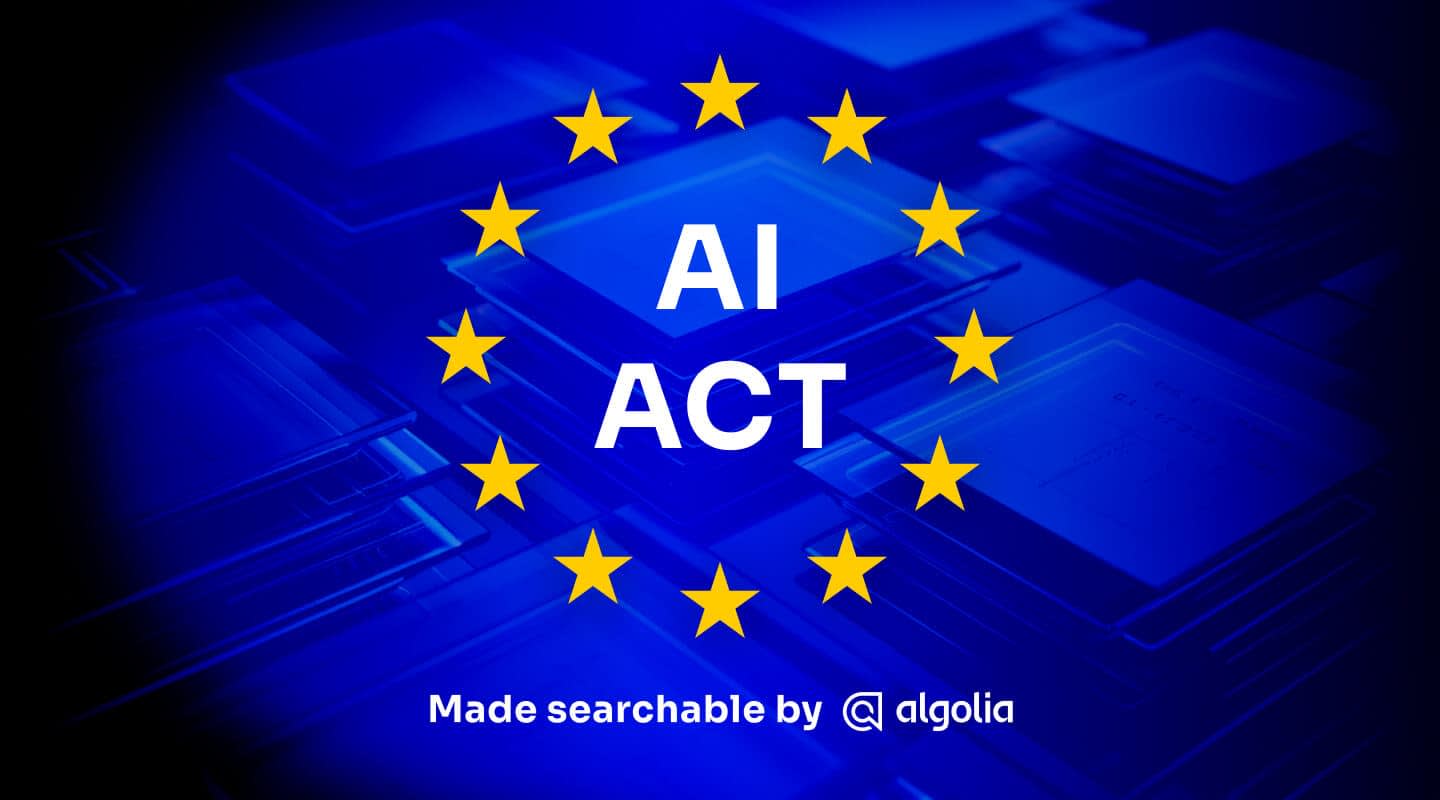

Navigating the EU AI Act with Algolia AI Search
source link: https://www.algolia.com/blog/algolia/navigating-the-eu-ai-act-with-algolia-ai-search/
Go to the source link to view the article. You can view the picture content, updated content and better typesetting reading experience. If the link is broken, please click the button below to view the snapshot at that time.
Navigating the EU AI Act with Algolia AI Search
Apr 25th 2024Algolia

We’re excited to release a free resource for anyone who wants to research or better understand the new European 2024 AI Act. This new site makes the AI Act easily searchable and browsable — with Algolia search, of course..
Earlier this year, European Union legislators granted definitive approval to the artificial intelligence legislation of the 27-nation bloc, setting the stage for the implementation of world-leading regulations later this year.
With a resounding majority, lawmakers in the European Parliament endorsed the Artificial Intelligence Act, following five years of deliberation since its initial proposal. Anticipated to serve as a benchmark for global governance, the AI Act provides guidance for other administrations contending with the regulation of swiftly evolving technologies.
This is a landmark legal move and was spurred by the rapid proliferation of AI technologies everywhere, prompting a shift from ethical guidelines to a solid legal framework for AI policy.
The ramifications of the AI Act are far-reaching, not only due to its status as the world’s inaugural legally binding AI legislation, but also because of its emphasis on risk assessment and enforcement mechanisms.

Penalties for organizations who do not adhere to the new AI Act
Originally designed as consumer safety legislation, comparable to many EU regulations, the AI Act adopts a “risk-based approach” towards products or services employing artificial intelligence.
Under this framework, AI applications are subject to varying levels of scrutiny based on their perceived risk. Indeed, the majority of AI systems are anticipated to be low risk and only include functionality such as content recommendations or spam filters. Companies will have the option to adhere to voluntary requirements and codes of conduct in these cases.
In contrast, high-risk AI applications, such as those used in medical devices or critical infrastructure like electricity or telecoms networks, are subject to more stringent requirements. These may include the use of high-quality data, measures to address bias, human oversight, the provision of transparent information to users, as well as others.
Certain AI applications are prohibited due to their deemed unacceptable risk, such as social scoring systems governing individual behavior, specific forms of predictive policing, and emotion recognition systems in educational and workplace settings.
Moreover, the EU AI Act prohibits certain uses, such as the police using AI-powered remote “biometric identification” systems for facial scanning, except in cases of serious crimes (e.g., kidnapping, terrorism, …).
The EU AI Act represents a landmark piece of legislation designed to address ethical and practical challenges posed by AI technology. It covers a wide range of topics, including requirements for high-risk AI systems, data governance, transparency obligations, and penalties for non-compliance.
However, navigating such a complex legal document can be daunting for policymakers, businesses, and individuals alike. Considering its importance and to ease this complexity, Algolia developed a searchable website comprising the AI Act that acquaints users with the obligations and structure outlined in the AI Act.
Screenshot from the searchable AI Act site.
This new website provides access to crucial information about the EU AI Act: leveraging Algolia AI Search to make the AI Act searchable, thus helping find and discover different aspects of the Act quick and easy.
From a pure business user perspective, it is clear that there is a need for an easy-to-use method to access critical information from the EU AI Act. Working with a team of Algolia developers and legal experts, we designed and launched a dedicated website aimed at providing comprehensive information about the new legislation. At the core of this site lies Algolia AI Search, a powerful search-as-a-service platform, that enables anyone to find relevant content quickly and efficiently about the Act.One of the key features of the Algolia-powered website is its intuitive search interface using advanced search algorithms. Users can enter keywords or phrases related to their specific areas of interest, and the search engine will instantly return relevant results from the EU AI Act. This streamlined search process eliminates the need for manual browsing through lengthy legal texts, saving valuable time and effort.
This is a good example of how search can be deployed on information-rich sites. The search capabilities are customizable and extend beyond simple keyword matching. Sophisticated ranking algorithms prioritize search results based on relevance, ensuring that anyone using the site will be presented with the most pertinent information first. This is particularly useful for policymakers and legal professionals, who need to quickly locate specific sections or provisions within the EU AI Act, but these features can extend to any legal, media, or content-heavy sites.
In addition, the website is designed with usability and accessibility in mind, ensuring that it is intuitive and easy to navigate for users of all backgrounds and expertise levels. Whether you’re a seasoned legal expert or a newcomer to the world of AI regulation, the website provides a user-friendly interface that makes exploring the EU AI Act a breeze.
By adding Algolia’s AI Search in any legal information website represents a significant advancement in the field of legal information access. By harnessing the power of AI-driven search algorithms, such a website will deliver a seamless and efficient user experience, enabling stakeholders to stay informed about the latest developments in any legal field.
If you’re interested to learn how you might apply Algolia AI Search to your site, get in touch for a custom demo.
Recommend
About Joyk
Aggregate valuable and interesting links.
Joyk means Joy of geeK
